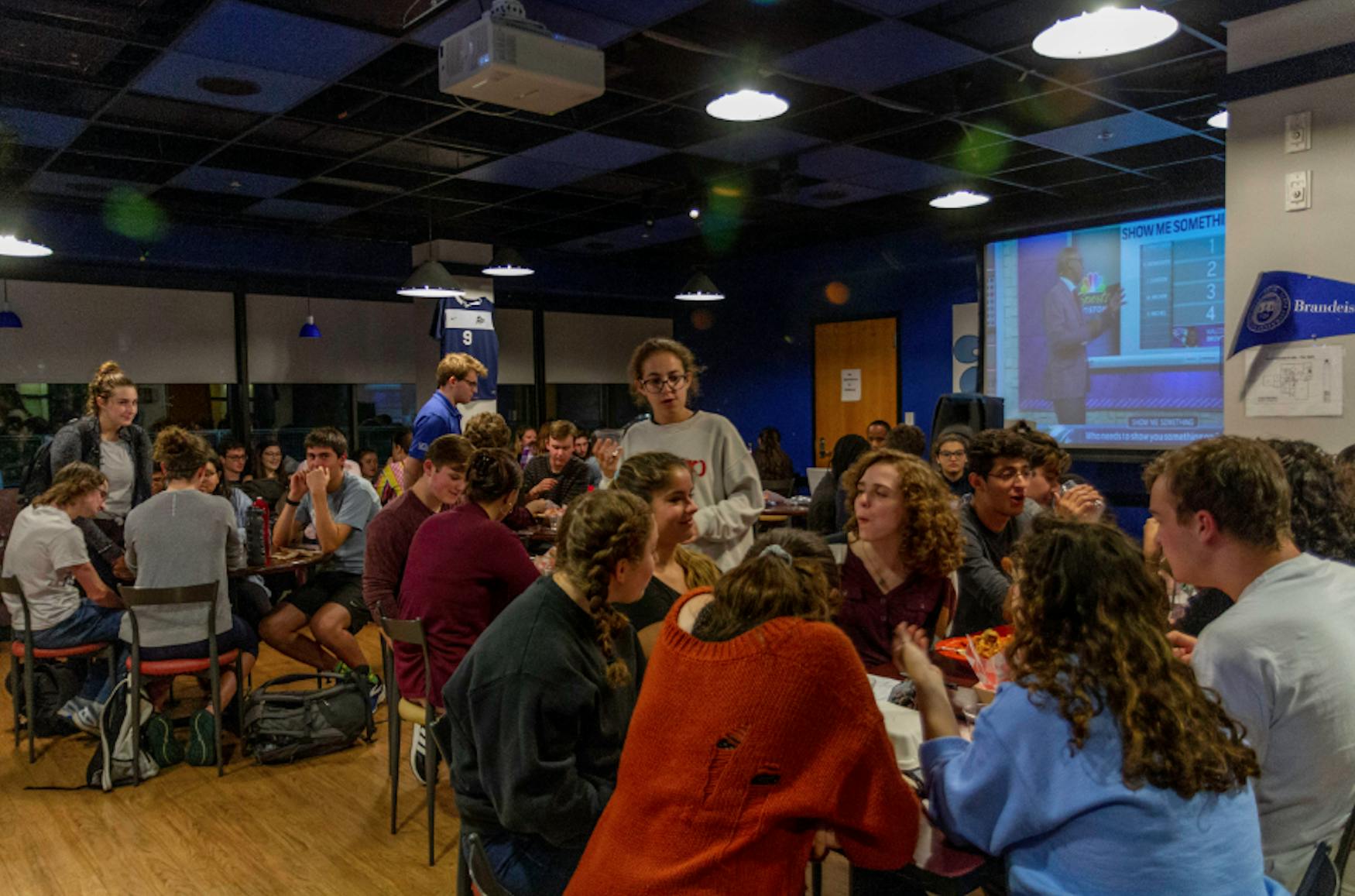Not So Trivial
For some students, Trivia Night is an escape from stress.
The story of trivia begins in the Ancient World. Trivia, meaning “unimportant matters,” derived as a back-formation of trivialis, which meant “found everywhere, commonplace” or “vulgar.” An online column from Merriam-Webster, shedding light on the etymology of trivia, noted that the term — and the titular game — “sometimes gets a bad rap” because of a related word, trivial, meaning “of little worth or importance.” When used in a singular construction, it means “a quizzing game involving obscure facts.” The lay meaning of the trivia, according to Merriam-Webster, is “obscure facts and details that aren’t applicable to one’s day-to-day life.”
But if last Thursday, Sept. 27, indicated anything, it’s that trivia is anything but — at least for the Brandeis students who arrived in scores at the Stein that night for the Department of Student Activities’ monthly Trivia Night. Representing nearly every major at Brandeis, 19 teams formed among friends and strangers alike, and they competed over five rounds to answer 25 questions about sports, current events, history, entertainment and animals. Breaks between rounds gave players time to mingle while the announcer tallied their points. A bonus round was planned, though time did not permit it, as the event stretched well past its 11 p.m. end time.
The mood was energetic and fun, with players able to choose their own teams and name them. “Who held the Billboard’s Number One song in March of 2018 with the title ‘God’s Plan?’” the announcer asked during Round Four before teasing players that they couldn’t come to Trivia Night in the future if they missed this question. Players did not shy away from expressing themselves either, getting many laughs throughout the night. “What is the earliest surviving system of laws on the earth?” the announcer asked during Round Three, to which Lyle James ’21, a member of Grape Jooz, proposed “the Code of Harambe.”
“It’s a great way to relax. It’s a very low-key atmosphere,” a member of I Like Your Shirt said of trivia, describing the amusement in “proving that you have more random facts in your brain than anyone else.” When asked how to improve, the same member responded, “just pay attention to the stuff around you, or become addicted to NPR podcasts.”
“Get the answers beforehand,” Trevor Filseth ’20, a member of Faiyaz, deadpanned, suggesting, more seriously, to be good at trivia you must rely on hunches and believe in yourself. Faiyaz Rahman ’20, another member of the team, agreed, both of them explaining that while it does not hurt to be smart, “anyone can win.”
Matt Kowalyk ’18, a member of Cool Cat Saves the Kids, recommended getting a group of people with “diverse life experiences and ranges of interest” to draw on, but ultimately admitted that “truly, you can’t prepare, but that’s the fun of it.” He added that “the questions aren’t super academic to the point where they alienate anyone.”
Other teams advanced their own ideas of what trivia means to them. We Wish This Was Bingo said that trivia is harder than it seems and is more of a social event than a contest. Dirt from Alaska argued that everyone has a place on a trivia team contributing to a “greater body of knowledge.”
Some teams also dispelled the misconception that only nerds or geeks play trivia, pointing to the diverse social cliques represented at the Stein that night, like a scene out of The Breakfast Club.
“I mean, everyone knows about something,” said Sam Cohen ’20, another member of Cool Cat Saves the Day. “If you play an instrument, you’ll know a lot about that instrument. If you play a sport, you’ll know a lot about that sport ... Everyone does something.”
What unites most of these teams is not really a desire to see who the quiz whiz is, but to merely have a good time with friends. As Kowalyk put it, “of course it’s about winning, but it’s not about winning.”
Some of the players’ descriptions, however, defied the dictionary definition of trivia. “No knowledge is useless,” declared Cohen. Kent Dinlenc ’19, a member of Dirt From Alaska, agreed, saying, “It’s fun to know trivia. It incentivizes cultural literacy and allows people to find common interests amongst themselves. It fuels water cooler conversation.”
Merriam-Webster did go on to clarify that trivia ties to knowledge in another way. In medieval times, “the Trivium referred to the threefold education curriculum encompassing Grammar, Logic, and Rhetoric … [it] was regarded as ... the foundation of a liberal arts education.”
But it is true that not all who frequent the Stein on Trivia Night are there to play or care to know what it is. The Brandeis Quiz Bowl Team is the only other trivia-based club on campus; they average just 10 members per meeting, making the trivia presence at Brandeis as obscure as the questions players try to answer. If anything, Trivia Nights at the Stein and biweekly meetings of the BQBT demonstrate that, despite obscurity, there are people at Brandeis who find more meaning in trivia than its dictionary definition would lead you to believe.
— Kent Dinlenc ’19 is a senior staff writer for the Justice.



Please note All comments are eligible for publication in The Justice.